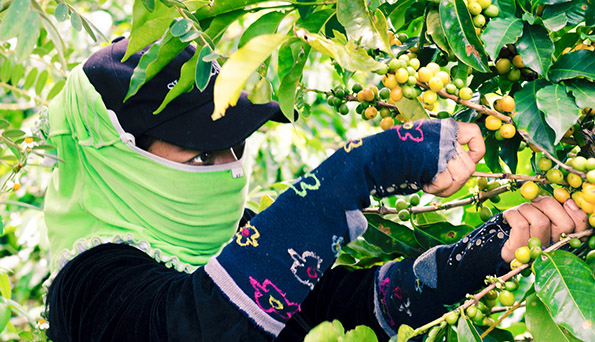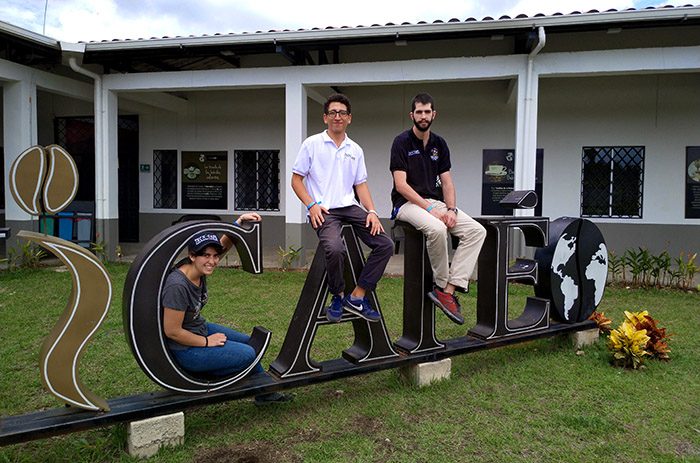'A good cup of coffee in peace'
The UPM works closely with Colombian institutions to develop the Department of Cauca through applied research and knowledge transfer on coffee production.
March, 2021
VIRGINIA DÍAZ BARCOS*
The Parque Tecnológico de Innovación del Café (Tecnicafé) and the Corporación Universitaria Comfacauca (Unicomfacauca) have been given a joint award in 2021 granted by the Universidad Politécnica de Madrid (UPM) in the research field: International Cooperation Award in Research for Development. Both institutions are located in the Department of Cauca (Colombia) and, in coordination with the UPM, and especially with the Escuela Técnica Superior de Ingeniería Agronómica, Alimentaria y de Biosistemas (ETSIAAB), have been working since 2014 in the region's territorial development, both in the field of applied research and knowledge transfer.
The Department of Cauca is a multi-ethnic and multicultural territory. Its economy bases on agricultural production (fique, sugar cane, panelera cane, coffee, potatoes, corn, yucca, beans, tomatoes, blackberries and asparagus), livestock, meat by-products, dairy products and, to a lesser extent, fish farming. Unfortunately, this Department has been seriously affected by the Colombian armed conflict. It has shown a strategic environment where several armed actors have been part of Cauca's daily life. The good news is that Cauca is one of the world's areas with the most significant potential for producing high-quality coffees due to its exceptional environmental conditions (location, altitude, soils and climate). Research from the National Federation of Coffee Growers in 2019 has shown that this is the country's area with the highest number of small producers of coffee (93,000 out of 560,000 families in the whole country).
Cauca has a high potential for generating value and development through coffee production, especially considering the evolution of the world coffee market and the characteristics of its demand. UNESCO designated Cauca's capital - Popayán, formerly the Nueva Granada Kingdom's capital, as a Creative City of Gastronomy in 2005. This circumstance generated new expectations for the gastronomic-tourist sector and culinary art.

Coffee grower of the Department of Cauca (Colombia). / David Pérez López
The UPM, Tecnicafé and Unicomfacauca union started in this framework, and, over time, it has extended to other sectors in addition to the coffee sector. The ultimate goal is to promote the Cauca's territorial development, so necessary in the post-conflict Colombian scenario, which has not yet been consolidated.
Tecnicafé is a public-private, non-profit corporation, formed by institutional representatives of the Colombian State (Government of Cauca), sectoral entities (Federation of Coffee Growers), private Spanish companies (such as Supracafé and Multiscan), the Coffee Quality Institute (CQI) and farm communities such as the Association of Women Coffee Growers of Cauca (AMUCC). This management platform strives for open and collaborative innovation and represents adding value for Cauca and Colombian coffee growth.
Unicomfacauca, a university that conceives formative research as a cross-cutting pillar to develop creativity and innovation, seeks to train students in the research culture, creating research workshops in academic programmes. It is also a member of the Union of University Social Responsibility in Latin America (URSULA), an area of confluence for the different development actors (civil society organisations, governments, agencies, companies), in pursuit of in-depth discussion about the role of the University and the strategies and methodologies to carry it out.
In recent years, both institutions have received more than 20 students from the UPM, mainly from the ETSIAAB. Students from the ETS de Ingeniería de Montes, Forestal y del Medio Natural (ETSIMFMN), the ETS de Arquitectura (ETSAM), and the y la ETS de Ingenieros Industriales (ETSII) have developed their Final Bachelor Degree Project or Final Master Degree Project in more than 20 applied research and technological development projects from Cauca. Besides technological learning, students have got into an invaluable background in developing transversal skills essential in today's learning.

ETSIAAB students in the Tecnicafé facilities, Cauca (Colombia). / Virginia Díaz Barcos.
The Social and Productive Group of High-Quality Coffee developed in the region deserve special mention. Since 2015 it has been researching and working for improvement. In addition to students, teaching and research staff, particularly from the ETSIAAB, have been involved.
The implementation of digital technology in rural areas made it possible to internationalise the process in South-South collaborations in 2020, despite the limitations derived from the pandemic. We also participated in training ex-combatants with agricultural and socio-entrepreneurial technology for promoting their active participation in strategic spaces for the coffee value chain.
Next May, the ETSIAAB will promote webinars about coffee and coffee growing by the coordinators of the Food Production Workshop and Food Processing Workshop subjects of the Bachelor Degree in Agricultural Engineering and Food Engineering, respectively. Representatives of Tecnicafé and Unicomfacauca will be speakers at the talks.
* Virginia Díaz Barcos is a lecturer in the Department of Food Chemistry and Technology.

